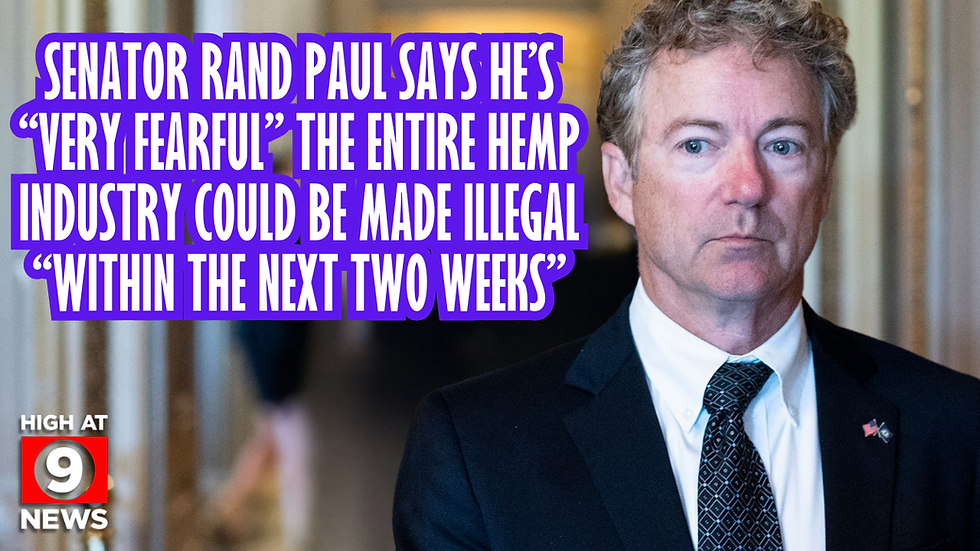DEA Bungles Marijuana Policy- Blocks FDA Studies While CCP Illegal Marijuana Grows Flourish
- Jason Beck

- Jun 18
- 3 min read
Updated: Jun 19
June 18, 2025

Washington, DC – June 18, 2025 – MMJ BioPharma Cultivation, a U.S.-based company authorized by the Food and Drug Administration (FDA) to produce pharmaceutical-grade cannabis for clinical trials, has been stalled for over 2,300 days by the Drug Enforcement Administration (DEA). Since submitting its application in 2018, MMJ has faced repeated obstacles from the DEA’s Diversion Control Division, hindering its efforts to advance research on treatments for Huntington’s Disease and Multiple Sclerosis, both designated as orphan drug indications. Concurrently, the nation grapples with a surge in illicit cannabis products and unregulated grow operations, raising serious public health and safety concerns that the DEA has failed to adequately address.
Regulatory Obstruction Impedes Medical Progress
MMJ BioPharma Cultivation’s application, compliant with FDA standards, seeks to supply pharmaceutical-grade cannabis for clinical research. Despite its alignment with federal scientific protocols, the DEA has imposed prolonged administrative delays, including mandating unconstitutional Administrative Law Judge (ALJ) hearings that contravene Supreme Court precedent. The agency has disregarded statutory deadlines, withheld proper Orders to Show Cause, and operated in violation of its own Training Manual, which prohibits using delay as a de facto denial mechanism. These actions have effectively blocked MMJ’s ability to contribute to medical advancements for patients with debilitating conditions.
Unchecked Illicit Cannabis Market
While the DEA obstructs lawful scientific endeavors, illicit cannabis products proliferate nationwide. A recent Florida Department of Agriculture study revealed alarming trends in the unregulated hemp market:
64% of hemp-derived products sampled from Florida retail stores contained illegal marijuana under federal law.
44% were contaminated with pesticides posing significant health risks.
Products included synthetic cannabinoids such as Delta-8 THC, THC-P, and HHC, sold without DEA oversight, age restrictions, or FDA medical justification.
This unregulated market not only endangers consumers but also undermines legitimate research by exploiting legal loopholes that the DEA has failed to close.
Transnational Criminal Networks Operate with Impunity
Compounding the crisis, investigative reports from The Daily Caller and The Maine Wire have exposed over 270 suspected illegal marijuana grow operations in Maine, linked to the Sijiu Association, a group allegedly tied to the Chinese Communist Party’s United Front Work Department. Raids have uncovered thousands of cannabis plants, processed marijuana, methamphetamine, and illegal neurotoxins. Despite alerts from the Department of Homeland Security and FDA, the DEA’s response to these interstate and transnational criminal activities has been inadequate, raising questions about its enforcement priorities.
Systemic Failures and Misallocated Resources
Critics argue that the DEA’s focus on obstructing FDA-compliant entities like MMJ BioPharma Cultivation, while neglecting illicit operations, reflects systemic dysfunction. Notably, DEA officials Patrick Prevoznik and Matthew Strait, implicated in delaying MMJ’s application, were recently sent on a DEA-funded trip to Dubai to present as drug policy experts, highlighting a troubling misalignment of agency resources. As one observer noted, “The DEA delays lawful science at home while its officials speak as experts abroad, ignoring a national crisis.”
Impact on Patients and Public Health
The DEA’s inaction has far-reaching consequences. By delaying access to investigational treatments, the agency deprives American patients of potential therapies for severe illnesses. Simultaneously, its failure to regulate illicit cannabis markets exposes consumers to unsafe products and fuels criminal enterprises. The agency’s current approach prioritizes bureaucratic control over its core mission of public safety and scientific progress.
Recommendations for Reform
To address these failures, the incoming DEA Administrator, Terrance Cole, must prioritize immediate corrective actions:
Conduct a Comprehensive Audit: Investigate allegations of corruption and mismanagement within the Diversion Control Division.
Halt Unlawful ALJ Proceedings: Terminate hearings that violate legal standards and expedite pending applications.
Transfer Cannabis Oversight: Shift regulatory authority for pharmaceutical cannabis to the FDA and National Institutes of Health (NIH) to prioritize scientific rigor.
Ensure Accountability: Hold personnel accountable for delays and misallocated resources, ending practices such as rewarding officials with international engagements.
Call to Action
The DEA’s obstruction of MMJ BioPharma Cultivation’s lawful efforts, coupled with its inadequate response to illicit cannabis proliferation, demands urgent reform. By prioritizing science, transparency, and public safety, the agency can realign with its mandate and support advancements in medical research while addressing the growing threat of unregulated markets. For further details, contact MMJ BioPharma Cultivation or refer to official FDA and DEA communications.

















Comments